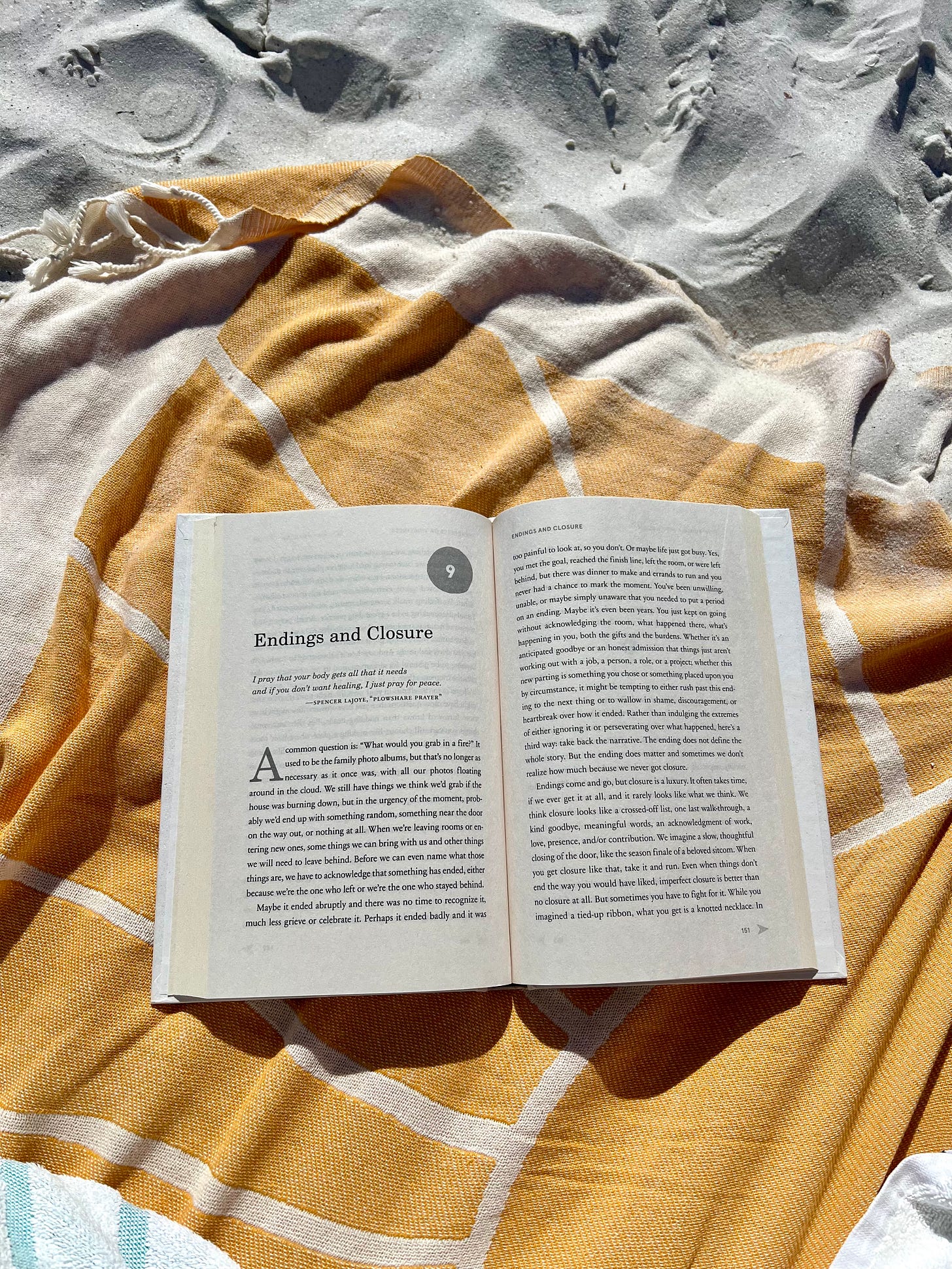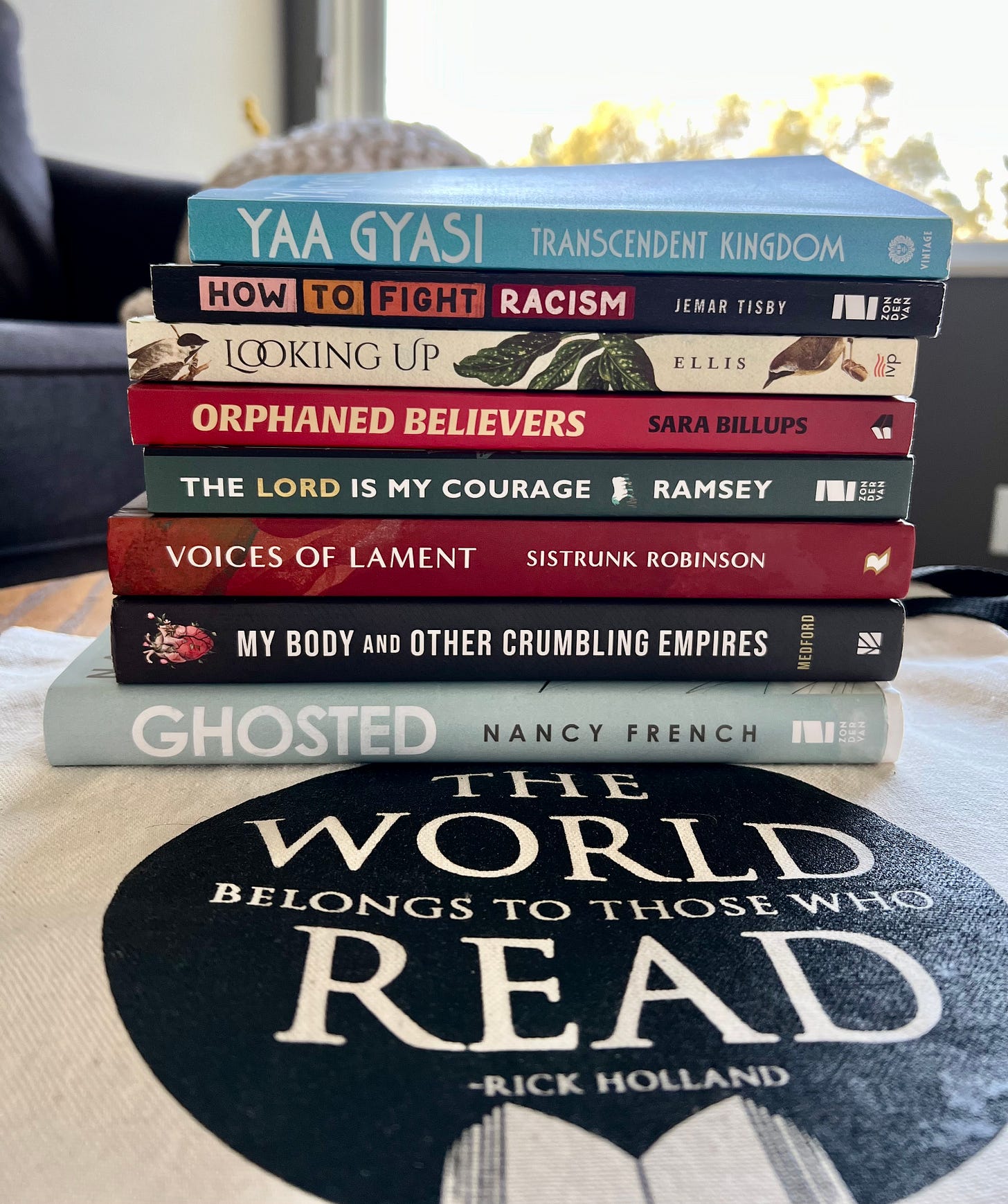Noticing & Naming: A Monthly Practice
Newness, imperfect closure, and finding what’s yours to do
Hello and welcome in! “Noticing & Naming” is a new series where I share a reflection about the previous month. I’m considering this post a chance to practice paying attention to my life and putting the often hidden, but deeply true, things into words. I hope this practice gives you just a little more language for your own life.
April morphed from torrential downpours and severe weather threats to idyllic blue-sky days, complete with sunshine and a refreshing breeze. In a similar way, the month held a lot of both-ands for me. There were days I made new friends, celebrated long-time ones, and felt hopeful about my work in a way I haven’t in a long time. And there were really raw, tender days. There was gratitude and grief, stress and sweetness, beauty and pain. I haven’t had a lot of time to sit with it yet, and I think I will be processing this past month for a good while. But this post is meant to be practice for me—a chance to put a few things into words, even as I’m still living them.
Annie B. Jones said it well in this April reflection where she writes:
“With all due respect to the Taylor Swift and enneagram experts among us, ‘I Can Do It with a Broken Heart’ isn’t simply an enneagram 3 anthem; isn’t this what all of us are doing, all the time? Walking around, doing our jobs, working the rhythms of our life—all while carrying grief and brokenness inside us while we do it. Do it with a broken heart? All of us, all the time.”
Yes and amen. All of us, all the time. We’re doing it—living and engaging in our lives—while carrying our burdens and tending to our broken hearts. So here’s a small look at April. There are a lot of words this month, probably because I’m fresh off a writing conference. Even still, this list is not exhaustive; it’s not a full picture of my reality because of course it’s not, but I hope it gives you just a little more language for your life. Take what you need.
Ten Things I Noticed:
I’m trying to pay attention to the world around me and to the details of my days. Sometimes these observations may lead to bigger realizations, but other times, the act of noticing is enough. Here are ten things I noticed last month:
The combination of warm sun, cool breeze, and movement (or sometimes stillness) is really healing for me.
There’s something soothing and grounding about running your hands through soft white sand or packing it down to create something solid.
While at the beach, I watched little kids work with such fervor at digging holes or filling buckets, committed to their imaginary mandate to move sand from one spot to another. They were so engrossed in their work that they ran or toddled right in front of us as we walked along the shore. But they didn’t care. Most of them didn’t even notice us standing there, having stopped abruptly to avoid a collision. Their task of sand relocation was all that mattered. I admired their commitment to their work and envied their freedom—they held no concern about what we might think, no fear of being an inconvenience.
Sometimes you read the exact words you need on exactly the right day.1

Emily P. Freeman’s new book, How to Walk into a Room, was a beautiful, much-needed companion last month. After three back-to-back trips, I felt pretty desperate for some unstructured time, some space to be alone, and the chance to finally unpack my suitcase.
I am in a rut with finding novels I can get into. If you’ve loved any recently, please drop the titles in the comments below!
I met a lot of new people last month. In general, my social circles feel pretty small these days, but April was a marathon of introductions through the Festival of Faith & Writing (FFW) in Grand Rapids, Michigan, and a church retreat.
Tears welled up easily again last month, especially in FFW sessions that talked about writing as a way of creating beauty, justice, and goodness in the world.
I came back from FFW with a lot of energy and desire to write but no time to do it. Isn’t that how things go?
I had some small victories in listening to my gut and choosing the gentler way last month, especially at FFW. Sometimes listening to my gut looked like going to a session I was excited about even if that meant risking getting lost on campus or sitting by myself. Other times, I chose the gentle route by staying in the same building to avoid the rain or skipping a session to browse the books for sale.
Five Things I Named:
I have a loud internal life, and naming what’s going on the inside helps to quiet things down. When we can put thoughts and emotions into words, fear begins to lose its power, next steps come into focus, and we realize that we’re not actually alone. Here are five things I named in the whirlwind that was April:
Writing, like any creative endeavor, is a way to create beauty, justice, and goodness in the world. I know and believe this, but wow, I needed the reminder. So much of this season of my life has felt unmoored and more than a little meandering. I’m writing, a little in public and a lot more in private, but I don’t always know why or to what end. I often doubt if it matters. But being in rooms with other writers, readers, and thinkers at FFW was what my heart needed. Hence the tears that kept springing to my eyes as I listened to the conference speakers talk about the power writing has to disrupt us, heal us, connect us, and help us create a better world. Those few chilly days in Michigan helped to remind me that this work matters.
We need newness and we need stability. I love traveling, but after all of the hotels, Airbnbs, and tiny cabins of April, it was such a relief to come home, to unpack my stuff, and to rediscover my routines. New people, new places, and new experiences wake me up, get me thinking, and widen my circles. I want and need all of those things. But I also need settledness, safety, and a sense that I know what to expect. Both are important for thriving.
When it comes to grief, marking significant dates matters to me. But it doesn’t have to be complicated. Even the simplest things are meaningful. In How to Walk into a Room,
says we rarely get the closure we need in life, especially when endings are sudden or tragic. Instead, she encourages us to fight for some sense of closure by finding our own way to mark an ending, no matter how imperfect it may be.
When you’re grieving, marking an anniversary, a would-be milestone, or any other significant date is a way of acknowledging your pain and saying, This matters. It can be really simple. You can use what’s already around you, and it’s okay if it feels a little stilted. You’re not doing it wrong. This is your grief; you get to decide what you need and when. Emily says fighting for imperfect closure is worth it: “Because closure isn’t about everything working out; it’s about acknowledging the ending.”Hospitality is contagious. And I’m not just talking about hosting dinner parties, although that is a lovely manifestation of hospitality too. I’m talking about hosting in a larger, embodied sense of the word—a “posture of welcome” as my friend
describes (and embodies) it.2
Being in large rooms with other writers at the Festival of Faith & Writing could have meant competition, comparison, and one-upping, but that was not my experience. Instead, I walked away with a spacious sense of being welcomed and wanted. (I talked about that recently here.) So much of that feeling came from people generously hosting me in many different forms, including inviting me to sit with them, introducing me to their friends, giving me a ride, helping me find a cup of coffee, texting me to check in, waiting for me, and asking questions about my work and my hopes. I bought a big stack of books at the conference and when I jokingly mentioned that I didn’t know how I was going to get them all home, Kendra, the owner of a bookstore called We Are LIT, insisted that I take her tote bag. That kind of hospitality is contagious.
As people welcomed me in, I found myself wanting to do the same thing for others. Last month challenged me not to be afraid to ask for help (people are surprisingly generous) and to look for ways to extend hospitality to others, even when I feel new too.I have to find the work that’s mine to do. In an interview at FFW, author and enneagram teacher Suzanne Stabile said the leading question of her life is What is mine to do? Several other speakers echoed this idea of discerning your own work and accepting that your path is not going to look like someone else’s.
In one of her sessions, author and teacher Marilyn McEntyre challenged us to “listen to the call of the moment.” She asked: What is this season, year, day, or minute about? What’s given to you? What are you being faithful to? Where does your urgency or ambition to write this come from? In another session, author and teacher Ayşe Papatya Bucak put it this way: What would it give you pleasure to build your writing life out of?
All of these questions apply to writing, but they also apply to life more broadly. What are the threads and themes you see in your life? How are you naturally wired? Where do you feel an urgency to act? How can you lean into those things and find your work? What is yours to do?
Questions for Your Practice:
If you’re struggling to see how something in your life matters right now, consider these questions: Where are you creating beauty? Where are you telling the truth? Where are you bringing order out of chaos? Where are you pursuing goodness? Where are you fighting for justice?
If you’re grieving, what’s a small way you could mark a significant date? Who can you invite into that with you?
What’s one practical way you could extend hospitality to someone in your life, even if you feel new too?
What would it give you pleasure to build your life out of? What’s yours to do? (All credit to Ayşe Papatya Bucak and Suzanne Stabile, respectively, for these questions.)
Words That Resonated:
In an effort to give us more language for our lives, here’s a smattering of quotes that stuck with me last month.
“The secret to good writing is telling the truth. The secret to good living is telling the truth.” —Mary DeMuth, “Stories as Healing” at the Festival of Faith & Writing
“If you find it difficult to pray, why don’t you try writing to God instead? Remember, everything we do is prayer. God will read what you write, and he will answer your writing like prayers. From your pen to God’s ear.” ―Yaa Gyasi, Transcendent Kingdom
“The consolation of imaginary things is not imaginary consolation.” ―Roger Scruton
“When it comes to changing our minds, proximity is a most compelling companion: proximity to people, to their pain, and to the God who loves us all.” —Emily P. Freeman, How to Walk into a Room
Thanks for reading. Lifting you up as you name what matters, fight for imperfect closure, and discern what’s yours to do in this season.
I finished reading
’s new book, How to Walk into a Room, on the beach in early April, and then I turned around and started it all over again. This is a book I’ll be returning to again and again for guidance on navigating endings and beginnings.I had the honor to read an early copy of
’s new book, The Way of Belonging, and I can say that you’re going to want to add this one to your shelves. It comes out in a little more than a month, and you can preorder it now to support Sarah’s work (and get some fun extras!). Preorder it here to get all the details.










1. The Annie B. Jones quote made me smile
2. Your pictures are beautiful
3. I’ve been thinking so much about how people should be hospitable toward me since I’m the new person that I forgot I could be hospitable too. You reminded me
I walked away from the FFW with that sense of spaciousness too. That’s a great way to say it. And what a gift! It makes me want to continue to open my arms wider.